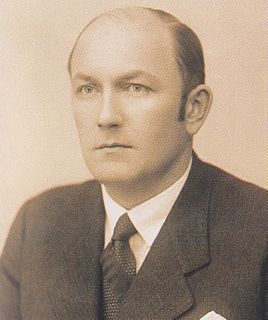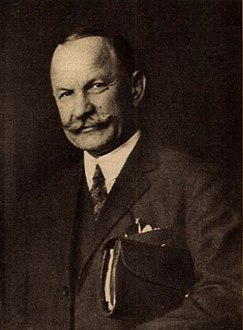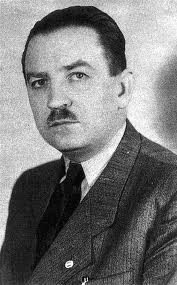
István Dobi was a Hungarian politician who was the Prime Minister of Hungary from 1948 to 1952. He was the first Communist to hold the post, joining the party shortly after it seized full control of the country in 1949.

Lajos Dinnyés was a Hungarian politician of the Smallholders Party who served as the last pre-communist Prime Minister of Hungary from 1947 to 1948.

The Hungarian Justice and Life Party is a nationalist political party in Hungary that was founded by István Csurka in 1993.

The Independent Smallholders, Agrarian Workers and Civic Party, known mostly by its acronym FKgP or its shortened form Independent Smallholders' Party, is a political party in Hungary. Since the 2002 parliamentary elections, the party has won no seats.
A smallholding is a small farm. Smallholdings are usually farms supporting a single family with a mixture of cash crops and subsistence farming. As a country becomes more affluent, smallholdings may not be self-sufficient but are valued primarily for the rural lifestyle that they provide for the owners, who often do not earn their livelihood from the farm. There are an estimated 500 million smallholder farms in the world, supporting almost two billion people. Today some companies try to include smallholdings into their value chain, providing seed, feed or fertilizer to improve production. Some say that this model shows benefits for both parties.

Luing cattle are a beef breed developed on the island of Luing in the Inner Hebrides of Scotland by the Cadzow brothers in 1947. It was formed by first crossbreeding Beef Shorthorn with Highland cattle and then breeding the resulting progeny with Beef Shorthorns to produce an animal three quarters Beef Shorthorn, one quarter Highland. The breed of red-brown cattle are moderately sized and extremely hardy. The intent was to produce a good beef cow with the ability to raise a calf under adverse weather conditions. It was officially recognised as a breed by the British government in 1965. The breed is still farmed today, mainly in Scotland but also in other areas of the world.

Wigmore is a suburb/village in the southeast of the Medway conurbation in Kent, England. It is broadly bounded by the A278 road to the west, Rainham to the north and the M2 motorway to the south.

Parliamentary elections were held in Hungary on 4 November 1945. They came at a turbulent moment in the country's history: World War II had had a devastating impact; the Soviet Union was occupying it, with the Hungarian Communist Party growing in numbers; a land reform that March had radically altered the property structure; and inflation was rampant. The Independent Smallholders Party won a sweeping victory, but its gains were gradually whittled away by Communist salami tactics, fulfilling the prediction of their leader Mátyás Rákosi that the defeat would "not play an important role in Communist plans".
Parliamentary elections, which later became infamously the "blue-ballot" elections, were held in Hungary on 31 August 1947. The Hungarian Communist Party, which had lost the previous election, consolidated its power in the interim using salami tactics. Communist-led political intrigues had deprived their opposition of its democratically-won mandate from 1945, as numerous prominent anti-Communists were removed from office on charges of conspiracy. These conspiracies reached a climax in late May 1947 when the Hungarian Communist Party had deposed the democratically-elected Prime Minister Ferenc Nagy in a coup d'etat, removing one of the strongest opponents to their rule and crippling the opposition. This weakening of the opposition, combined with a revised electoral law, led to further Communist gains.

The Second Hungarian Republic was a parliamentary republic briefly established after the disestablishment of the Kingdom of Hungary on 1 February 1946 and was itself dissolved on 20 August 1949. It was succeeded by the People's Republic of Hungary.

István Szabó de Nagyatád was a Hungarian politician, who served as Minister of Agriculture three times: in 1919, between 1920 and 1921 and from 1922 to 1924.

János Mayer was a Hungarian politician, who served as Minister of Agriculture twice: between 1921-1922 and 1924–1931. He farmed on his parents' possession after the accomplishment of his studies. He was already engaged in the smallholder movements in his early years. With István Szabó de Nagyatád he founded the Smallholders Party in Heves County. He became a member of the Diet of Hungary in 1914, representing Kápolna and his party. He was appointed secretary of state of the Ministry of Food in January 1919, but he resigned before the establishing of the Hungarian Soviet Republic.

Béla Kovács was a Hungarian politician, who served as Minister of Agriculture from 1945 to 1946 and in the Hungarian Revolution of 1956.

Ferenc József Nagy was a Hungarian agrarian engineer and politician, who served as Minister of Agriculture between 1990 and 1991. After that he was appointed minister without portfolio, he also held this position in the cabinet of Péter Boross until 1994. Nagy was the chairman of the Independent Smallholders, Agrarian Workers and Civic Party for a short time.
Elemér Gergátz was a Hungarian veterinarian and politician, who served as Minister of Agriculture between 1991 and 1993.
János Szabó is a Hungarian jurist and former politician, who served as Minister of Agriculture between 1993 and 1994.

József Torgyán was a Hungarian lawyer and politician, chairman of the Independent Smallholders' Party (1991-2002), Deputy Prime Minister and Minister of Agriculture and Rural Development (1998-2001) in the Government of Viktor Orbán.

Parliamentary elections were held in Hungary on 25 and 26 January 1920. However, they were only held in 164 districts. After the Treaty of Trianon was signed, the 44 districts previously occupied by Romania voted between 13 June and 5 July, whilst the 11 districts occupied by Serbia did not vote until 30 and 31 October 1921. The election was held with compulsory voting. In protest at this and other changes to the franchise that left 60% of the voting age population unable to vote, the Hungarian Social Democratic Party boycotted the elections, and called for its supporters to cast invalid votes, resulting in an unusually high number of blank or invalid votes - 11.8% in the January elections and over 20% in Budapest and other major cities.
The Settlers' Party was a political party in Estonia.

Rubber Industry Smallholders Development Authority, abbreviated RISDA, is a Malaysian federal government agency under the Ministry of Economic Affairs (MEA) entrusted to oversee the smallholder sector as an important production sector in the national economy. RISDA was established on 1 January 1973 under the powers passed by Parliament:- the Rubber Industry Smallholders Development Authority (RISDA) Act 1972 [Act 85] and the Rubber Industry Fund (Replanting) Ordinance 1952.














